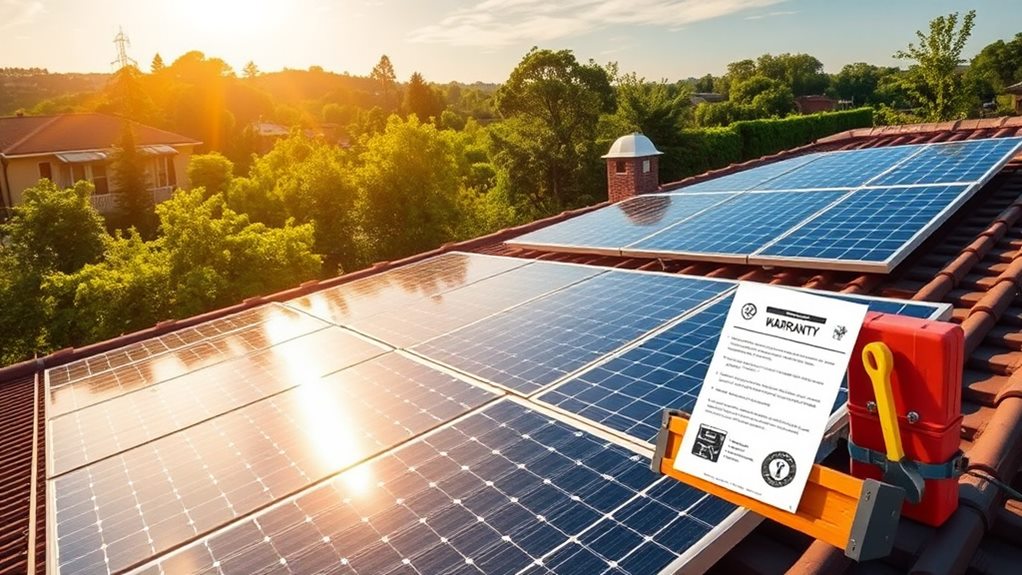To select the right solar contractor, start by evaluating their credentials and experience; look for proper licensing and relevant certifications, such as NABCEP, alongside a solid project portfolio. Next, compare proposals and pricing by examining the system's cost per watt and obtaining at least three detailed quotes. Research customer reviews on platforms like Google and Yelp, paying attention to overall ratings and recurring feedback. Understand local regulations by investigating permitting guidelines and incentives that may affect your installation. Finally, evaluate post-installation support, checking for warranty coverage and response times, which can greatly impact your long-term satisfaction. Further insights await you.
Evaluate Credentials and Experience

When selecting a solar contractor, credibility and experience are paramount. Start by verifying that the contractor holds the necessary licenses, such as a state electrical contractor license, which is essential for legal compliance. Certifications like NABCEP not only indicate a commitment to the industry but also showcase expertise in solar installations. Aim for a contractor with at least two years of experience, as this duration typically guarantees reliability and quality of work.
Additionally, consider checking customer reviews to understand the contractor's reputation in the community.
Next, review their portfolio of past projects to assess their experience and track record. Look for successful solar installations similar to your needs.
To gauge the contractor's reputation further, investigate customer testimonials and online reviews to confirm feedback about their service quality and project outcomes. This step can provide invaluable insights into the contractor's reliability.
Compare Proposals and Pricing
As you evaluate solar proposals, focus on comparing the System Price per Watt ($/W), a key metric for determining cost efficiency. In Texas, average prices for a 6 kW system range from $2.81 to $3.64. This comparison allows you to gauge the value you'll receive from each solar energy system.
Additionally, pay close attention to the Production Estimates (kWh per kW) included in each proposal. These estimates help you understand the expected annual energy yield, enabling you to normalize comparisons between different systems. Understanding solar energy incentives can also provide insight into potential savings and benefits available to you.
Make certain that all quotes provide a clear breakdown of costs, encompassing equipment, installation, permits, and any additional fees. This transparency can help you avoid unexpected expenses down the line.
Also, consider the financing options presented, such as loans, leases, or Power Purchase Agreements (PPAs), as these can greatly affect your overall cost and payment flexibility.
Gather at least three quotes from different installers. This practice won't only guarantee competitive pricing but also offer a thorough understanding of the available services and equipment.
Research Customer Reviews

Customer reviews serve as a valuable resource in your search for a reliable solar contractor. By utilizing platforms like Google, Yelp, and the Better Business Bureau (BBB), you can gain insights into various solar contractors' service quality and installation experiences.
Pay attention to overall ratings and specific feedback that highlights both strengths and weaknesses. Positive reviews can often indicate that a contractor has successfully helped clients shift to money-saving solar energy, which can be an essential factor in your decision-making process.
While researching, look for patterns in customer complaints, as these may reveal potential red flags, such as issues with installation timelines or post-installation support. Direct testimonials from previous clients can further illuminate a contractor's reliability and responsiveness during the installation process.
Additionally, analyze the contractor's online reputation by checking how they respond to customer reviews. This can indicate their commitment to customer service and their willingness to resolve any issues that may arise.
Understand Local Regulations
How well do you understand the local regulations governing solar installations? Before you start your solar project, it's vital to research the permitting requirements in your area to guarantee compliance.
California, for instance, has specific guidelines that can greatly impact your solar installation process, including state incentives and rebates that can help reduce your costs. Local regulations can vary greatly, so familiarize yourself with the specific rules that apply to solar energy systems in your jurisdiction.
Consult with local solar installers and solar contractors to gain insights into any zoning laws that may affect your installation. These laws dictate where and how you can install solar panels, so knowing them upfront can save you time and money.
Additionally, investigate net metering policies, which determine how your utility company credits you for excess energy produced by your system. Understanding these policies can help you maximize the financial benefits of your installation.
Don't overlook state-specific incentives and rebates that may be available, as they can greatly reduce the overall cost of your solar installation.
Assess Post-Installation Support

Once you've navigated local regulations and settled on a solar contractor, it's time to evaluate their post-installation support.
Start by requesting a clear outline of their post-installation support services. This should include how they handle warranty claims and maintenance issues. Knowing the specifics of their workmanship warranty—typically lasting between one to ten years—helps you understand what's protected after installation.
Next, confirm whether the installer offers free monitoring services. Proactive monitoring can identify and address potential issues early, ensuring your solar systems operate efficiently.
You should also inquire about the expected response time for service calls. A quick response can greatly mitigate system downtime, which is essential for your energy savings.
Final Thoughts
In selecting a solar contractor, prioritize credentials, compare proposals, research reviews, understand regulations, and evaluate post-installation support. By reviewing experience and expertise, you guarantee quality work. By comparing pricing, you secure value. By reading customer feedback, you gain insights. By understanding local laws, you navigate compliance. By evaluating support, you ensure ongoing satisfaction. Each step you take builds a solid foundation for your solar investment, empowering you to make informed decisions for a sustainable future.


Recent Comments